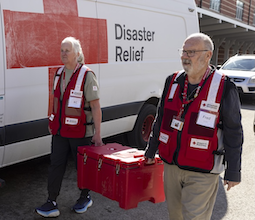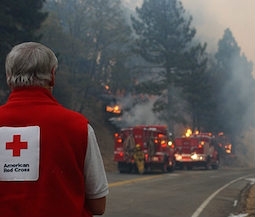Rugged conditions. Co-dwelling. Tents and cots. These are just some of the images that come to mind when one thinks of a military deployment. Especially when you're a member of the First Cavalry division in the U.S. Army, a group filled Staff Sargeant Daniel Rungo says gets a bad rap for being heralded as “the worst unit in the Army.” He doesn’t believe it.
Daniel deployed with the unit in the fall 2024 to Poland, setting up on Powidz, a forward operating base designed to provide security and combat presence on NATO’s eastern flank. Temporary sites like this often have minimal amenities and soldiers go without family. But where most see challenges, Daniel saw an opportunity: take advantage of Army benefits and pursue a master’s degree. It’s something he never would have imagined 11 years ago when he was driving trucks and working seasonally on grain elevators in the fields of Texas, struggling to find consistent work.
“I went to college when I was 19. The debt was $7000 for one semester. It didn’t math up. I dropped out and paid it off in the Army,” shared Daniel, who since joining the Army has completed a bachelor’s degree and several other credited courses. He says deployments come with hidden perks like substantially shorter commutes.
“A typical day at deployment wasn’t that bad... It was a time management opportunity,” he said.
But studying while deployed presented unique challenges. The school where Daniel was enrolled administered proctored tests that required him to be on-camera and without interruption for the duration of the exam.
“And if anyone walks in the room, your test is over. So, the Red Cross [Respite] Center provided that... I didn't have privacy in the tent 'cause, there were 12 people in there. I didn't have privacy in my office because my officer was a Major, and he just seems to work all day. Never left the office, even on the weekends,” Daniel said with a smile and a shake of his head.
He even recalls the Wi-Fi on base struggling to keep up with the demand. Soldiers who just wanted to connect with family, stream movies and play video games on their off days all experienced outages.
“[The Wi-Fi] didn’t work. I couldn’t even take a test on it,” said Daniel.
However, after a fellow soldier tragically committed suicide, Daniel and his unit were called for a debrief at the Red Cross Respite Center with the chaplain.
The center quickly became the choice spot for Daniel to spend his time when he wasn’t working. He started going in on a daily basis to study and in less than a month, he signed up as a Red Cross volunteer.
For nearly 140 years, the Red Cross has supported every major forward deployment and mobilization of the U.S. military. This support is provided by a global network of Red Cross employees and volunteers, ranging from deployment zones to military hospitals, and is scaled to meet the evolving needs of service members and military-connected families. Red Cross teams relay emergency communication messages during crises, provide respite activities, deliver care packages, and work alongside command leadership to ensure adequate care is present as humanitarian needs arise.
Red Cross Respite Centers are versatile and serve many different yet equally important purposes for the soldiers deployed overseas. On Powidz, the center is far more than comfy surroundings and a peaceful space. Staff and soldiers who choose to volunteer ensure this center stays open as late as midnight so soldiers who miss home can watch their favorite sports teams play and open as early 4:00 a.m. to support soldiers like Daniel who need a quiet space to take tests.
“[My] last month there, I think I just left my laptop,” laughed Daniel. “I left my laptop in there, because you know, I locked up... It sucks that I was away from my family. We all hated it and we complained like everybody else, but I got something done that no longer took time away from the family. I think that's a win.”
Another silver lining: friends.
“I’m 33. I don't leave the house for anything that my wife doesn't send me the store for, right?” joked Daniel. “But you know, I made some friends and those people, they have advice, and they have tips and tricks and they have something to teach you… so just being around the other volunteers. Just having conversation… there’s value there that you really don’t see when you’re at the bar drinking your life away.”
By the end of his deployment, Daniel had logged over 1,000 volunteer hours and was just a few essays away from his degree. When he returned home, his wife and two children were not only thrilled to see him but proud of their service member and all he was able to accomplish.
“My original plan 10 years ago was that I was going to retire after 20 years in the military,” shared Daniel. “I’ve put some second thought after all this education, and I’m hoping I can put it to use…[I’d like to] be a special agent with the FBI… that is the goal.”
Daniel graduated with his M.B.A at the end of April. He may have completed his studies but he’s looking to volunteer with the Red Cross North Texas Region near Fort Cavazos. The Red Cross is proud to be there for our nation's military members providing both services and an avenue for giving back.















